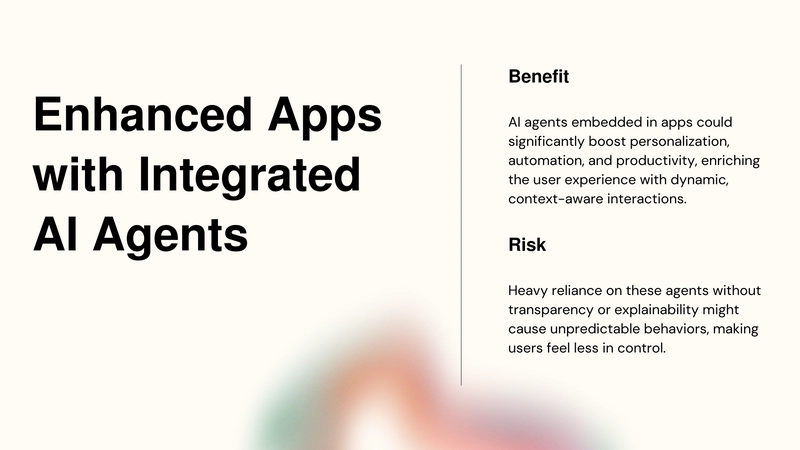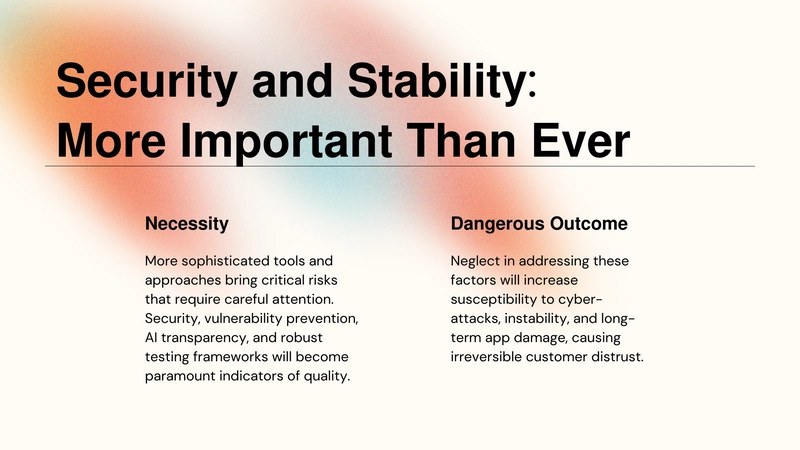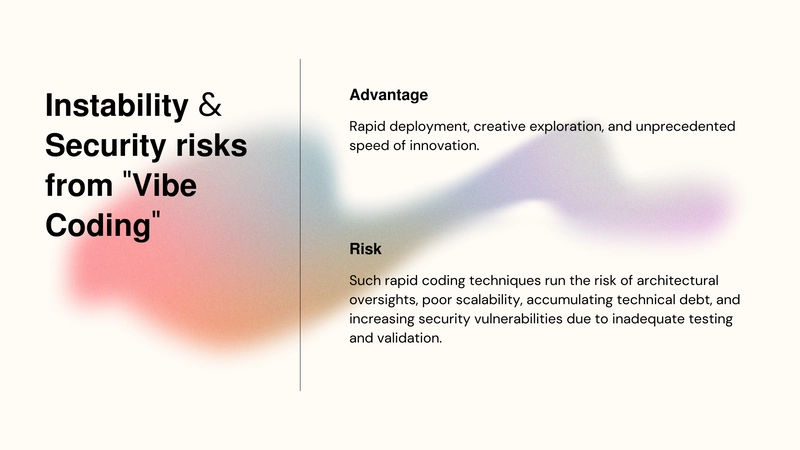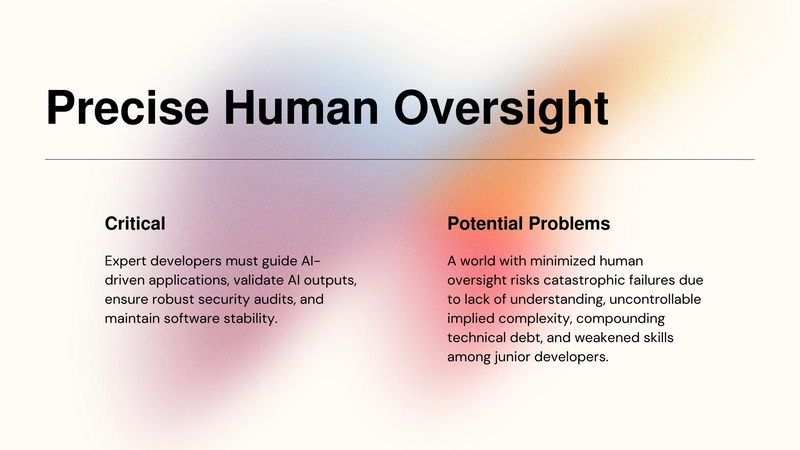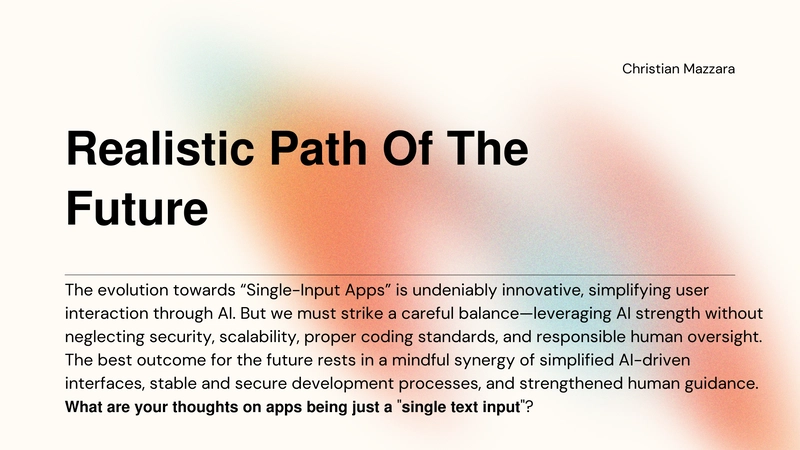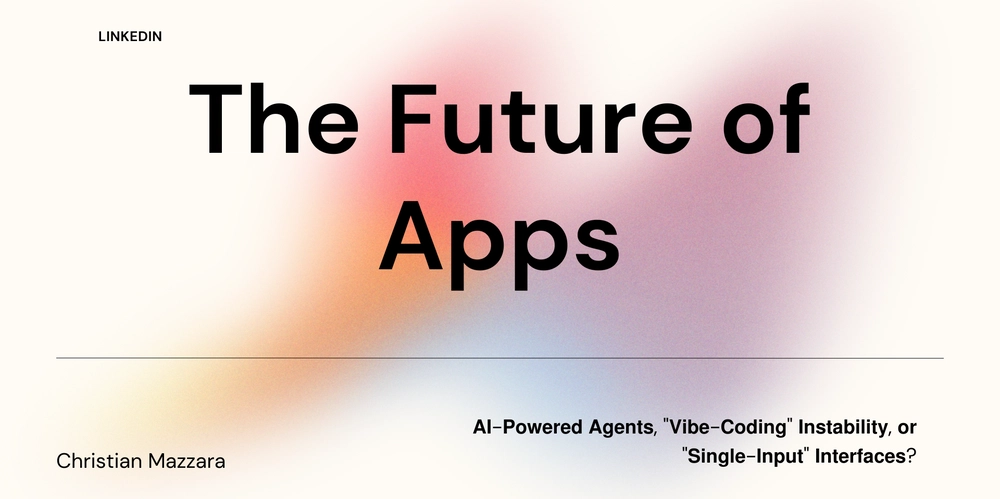As AI rapidly reshapes software development, we’re seeing transformative concepts emerge about what future apps might look like. Let’s dig into key scenarios likely to define the next generation of applications:
1️⃣ 𝗦𝗶𝗻𝗴𝗹𝗲-𝗜𝗻𝗽𝘂𝘁 𝗔𝗽𝗽𝘀 (𝗣𝗼𝘄𝗲𝗿𝗲𝗱 𝗯𝘆 𝗔𝗜):
- 𝗕𝗲𝗻𝗲𝗳𝗶𝘁: We are already observing apps shifting towards simplified, minimalist interfaces—often just a single text input. Here, the AI handles complex user interactions, interpreting context, user intent, and generating real-time responses and actions. This streamlines UI development drastically and enhances user engagement.
- 𝗥𝗶𝘀𝗸: Depending entirely on AI may lead to mismatches between user intent and action execution without adequate transparency or intuitive fallback mechanisms. Users might feel unclear or disconnected from how their queries produce certain results, creating potential friction in trust and usability.
2️⃣ 𝗘𝗻𝗵𝗮𝗻𝗰𝗲𝗱 𝗔𝗽𝗽𝘀 𝘄𝗶𝘁𝗵 𝗜𝗻𝘁𝗲𝗴𝗿𝗮𝘁𝗲𝗱 𝗔𝗜 𝗔𝗴𝗲𝗻𝘁𝘀:
- 𝗕𝗲𝗻𝗲𝗳𝗶𝘁: AI agents embedded in apps could significantly boost personalization, automation, and productivity, enriching the user experience with dynamic, context-aware interactions.
- 𝗥𝗶𝘀𝗸: Heavy reliance on these agents without transparency or explainability might cause unpredictable behaviors, making users feel less in control.
3️⃣ 𝗜𝗻𝘀𝘁𝗮𝗯𝗶𝗹𝗶𝘁𝘆 & 𝗦𝗲𝗰𝘂𝗿𝗶𝘁𝘆 𝗿𝗶𝘀𝗸𝘀 𝗳𝗿𝗼𝗺 “𝗩𝗶𝗯𝗲 𝗖𝗼𝗱𝗶𝗻𝗴”:
- 𝗔𝗱𝘃𝗮𝗻𝘁𝗮𝗴𝗲: Rapid deployment, creative exploration, and unprecedented speed of innovation.
- 𝗥𝗶𝘀𝗸: Such rapid coding techniques run the risk of architectural oversights, poor scalability, accumulating technical debt, and increasing security vulnerabilities due to inadequate testing and validation.
4️⃣ 𝗦𝗲𝗰𝘂𝗿𝗶𝘁𝘆 𝗮𝗻𝗱 𝗦𝘁𝗮𝗯𝗶𝗹𝗶𝘁𝘆: 𝗠𝗼𝗿𝗲 𝗜𝗺𝗽𝗼𝗿𝘁𝗮𝗻𝘁 𝗧𝗵𝗮𝗻 𝗘𝘃𝗲𝗿
- 𝗡𝗲𝗰𝗲𝘀𝘀𝗶𝘁𝘆: More sophisticated tools and approaches bring critical risks that require careful attention. Security, vulnerability prevention, AI transparency, and robust testing frameworks will become paramount indicators of quality.
- 𝗗𝗮𝗻𝗴𝗲𝗿𝗼𝘂𝘀 𝗢𝘂𝘁𝗰𝗼𝗺𝗲: Neglect in addressing these factors will increase susceptibility to cyber-attacks, instability, and long-term app damage, causing irreversible customer distrust.
5️⃣ 𝗣𝗿𝗲𝗰𝗶𝘀𝗲 𝗛𝘂𝗺𝗮𝗻 𝗢𝘃𝗲𝗿𝘀𝗶𝗴𝗵𝘁
- 𝗖𝗿𝗶𝘁𝗶𝗰𝗮𝗹: Expert developers must guide AI-driven applications, validate AI outputs, ensure robust security audits, and maintain software stability.
- 𝗣𝗼𝘁𝗲𝗻𝘁𝗶𝗮𝗹 𝗣𝗿𝗼𝗯𝗹𝗲𝗺𝘀: A world with minimized human oversight risks catastrophic failures due to lack of understanding, uncontrollable implied complexity, compounding technical debt, and weakened skills among junior developers.
𝗖𝗼𝗻𝗰𝗹𝘂𝘀𝗶𝗼𝗻: The evolution towards “Single-Input Apps” is undeniably innovative, simplifying user interaction through AI. But we must strike a careful balance—leveraging AI strength without neglecting security, scalability, proper coding standards, and responsible human oversight.
The best outcome for the future rests in a mindful synergy of simplified AI-driven interfaces, stable and secure development processes, and strengthened human guidance.
𝗪𝗵𝗮𝘁 𝗮𝗿𝗲 𝘆𝗼𝘂𝗿 𝘁𝗵𝗼𝘂𝗴𝗵𝘁𝘀 𝗼𝗻 𝗮𝗽𝗽𝘀 𝗯𝗲𝗶𝗻𝗴 𝗷𝘂𝘀𝘁 𝗮 “𝘀𝗶𝗻𝗴𝗹𝗲 𝘁𝗲𝘅𝘁 𝗶𝗻𝗽𝘂𝘁”?
